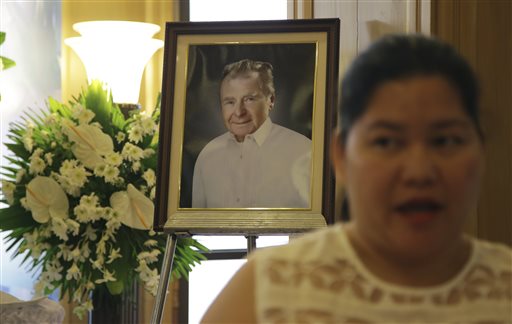
Filipino Alma Nardo talks beside a picture of her brother-in-law American Nobel laureate for chemistry Richard Heck during burial rites in suburban Quezon city, north of Manila, Philippines Tuesday, Oct. 13, 2015. Heck designed a method of building complex molecules that has helped fight cancer, protect crops and make electronic devices. AP
MANILA, Philippines — American chemist and Nobel prize winner Richard Heck was laid to rest in a Quezon city cemetery on Tuesday morning, reunited with his Filipina wife who passed away in 2012.
Heck’s final resting place at the Holy Cross Memorial Park in Novaliches was next to that of Socorro Nardo-Heck, his beloved wife of more than 30 years, said Socorro’s nephew Michael Nardo, 40.
Since the Heck couple decided to spend their retirement in the Philippines in 2006, Nardo, his wife, and daughter had been living with them in a bungalow-type home rented in Tandang Sora, also in Quezon city.
The Nardos have been acting as Heck’s immediate family since Socorro passed away, hiring two private caretakers to attend to his needs.
“He was quiet, simple. A little strict, but he never gets angry,” Nardo said in Filipino, of Heck.
Heck, 84, passed away on Friday while confined in a private room at the East Avenue Medical Center in Quezon City. Nardo said since Heck was struck by pneumonia in 2013, he started suffering from multiple ailments, including diabetes and liver cirrhosis. Heck also had a pacemaker for his heart ailments, and has had a hip replacement, Nardo said.
Heck began to be in critical condition last Tuesday, when he started vomiting after breakfast and when his stomach started to swell, Nardo said. Nardo and Heck’s caretakers initially brought him to the St. Luke’s Medical Center in Quezon City, where they had been taking him to for treatment. They were accommodated at the emergency room but had a “misunderstanding” about Heck’s insurance company failing to settle previous bills, prompting the
family to transfer to East Avenue, Nardo said.
Nardo declined to go into further detail regarding the issue, saying only that it has already been settled and he would rather his “uncle” be remembered for his accomplishments.
Heck’s modest life in the Philippines belies his accomplishments in the scientific world. In 2010, Heck along with Japanese Ei-ichi Negishi and Akira Suzuki, was awarded the Nobel Prize in Chemistry for the “palladium-catalyzed cross couplings in organic synthesis.”
Heck is credited for discovering, in the 1960s to 1970s, how to bond carbon atoms using palladium as a catalyst, allowing for the easier creation of complex chemicals. The process has been dubbed the “Heck reaction” and has been used in the creation and development of medicines and electronics.
This major contribution has not been lost on the local scientific community. On Monday evening, the De la Salle University (DLSU) organized a necrological service at Heck’s wake at the La Funeraria Paz on Araneta Avenue, also in Quezon city.
The service was attended by local scientists and academicians, from the National Academy of Science and Technology (NAST), the National Research
Council of the Philippines, the Ateneo de Manila University, the University of the Philippines (UP), and the Integrated Chemists of the Philippines (ICP), among others.
Heck received an honorary Doctor of Science degree from the DLSU in 2012, shortly after his wife passed away.
Heck’s death was considered by the local scientific community as “so much of a loss,” said DLSU mechanical engineering professor Alvin Culaba, also of
the NAST.
In a statement, the Integrated Chemists of the Philippines expressed their mourning. “Heck’s discoveries laid the foundation for all modern cross-coupling reactions. These reactions have revolutionized organic chemistry and are used to make new organic materials, agrochemicals, pharmaceuticals, and enabling technologies that impact our daily lives in innumerable ways.
“[Heck] was more than happy to attend scientific events. Even [the 2011 Philippine] Chemistry Congress, he attended in Cebu. He loves to meet with…students. I could sense that he wanted to inspire the young to pursue science, and hopefully to share his experience how he started to like chemistry,” Culaba said.
Culaba said he has spoken with UP’s Vice President for Academic Affairs Gisele Concepcion and Ateneo professor and ICP president Fabian Dayrit for a possible public forum on Heck’s work to be held in UP sometime next week.
At the service at Heck’s wake on Monday, Culaba read out excerpts of Heck’s speech during the conferment of his honorary degree in DLSU in 2012: “If my
own life should be any lesson, it is that I discovered that the seemingly impossible could actually be attainable. That the daunting is no less doable. That an ordinary boy from an unknown part of Massachusetts could well make his science change a whole lot everyone’s life.”
“I find my meaning in what I can bequeath to this world, when the glory and splendor of a celebrated achievement begins to wane, when I would have to
finally desert this earthly habitat, and leave myself to the Creator,” Culaba quoted Heck as saying.
“To Professor Heck, goodbye and thank you,” Culaba ended. SFM